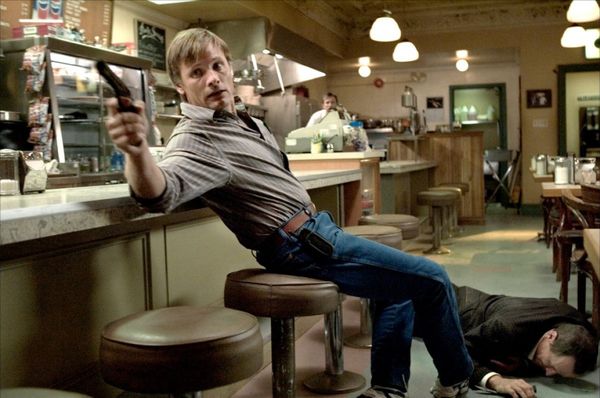Eye For Film >> Movies >> A History Of Violence (2005) Film Review
A History Of Violence
Reviewed by: Scott Macdonald

David Cronenberg's A History Of Violence is a smashingly effective, startling thriller and an elegant, thoughtful character study of a family, whose world is tested when an unwanted past remerges. It's also Cronenberg's first great film to eschew gimmickry - however ingenious it may be - to project his feelings as challenging, superbly constructed cinema. I'm delighted with this, since those who don't much care for his work, cannot dismiss the film as a flesh-feasting fantastical tale. Even though it's a straight-up story, one gets the impression that it is a perfect fit for his provocative sensibilities.
I used to think Cronenberg was a pessimistic filmmaker, choosing subjects concerning allegory, psychology, technology, biology and human experience that encourage thought and discussion, providing plenty to chew on, even when they don't quite come off. His best films are often worthy of study as social comment.

The gloriously ambidextrous title - when viewing the film, it's easy to see how it sneaks through the narrative so insidiously - is but the first question that Cronenberg proposes in a series of escalating philosophical constructs. However, it's a mistake to assume that the film is a dry sociological exercise. The power of his work is in its execution - casting, writing, implicit direction and strict adults-only frankness. This is an arthouse film that works best with a large crowd.
It opens with a pair of wanted criminals leaving a motel. In an audacious, glacially paced, hands off shot, they pack the car and chat inanely. When one of them returns to the room for water, the camera slowly reveals two fresh bloody corpses. The man's indifference immediately puts us on edge and the scene climaxes with another murder, a horrible taboo-breaker. This opening heightens the senses, polluting the sentimentality of small town American nostalgia.
Tom Stall (Viggo Mortensen, giving his finest performance) is a family man. He owns a cafe in Millbrook, Indiana, has a lawyer wife (Maria Bello, memorable from The Cooler), and two kids, one of whom is Jack (Ashton Holmes), an intelligent and thoughtfully political young man, who is bullied by an instinctively cruel jock, Jared (Steve Arbuckle, well cast for his intensity and angular facial features). When Tom's daughter Sarah wakes up screaming in the middle of the night, terrified of monsters, he tells her: "There's no such thing as monsters."
Cronenberg takes his time establishing the characters. I remember sighing at how much I was enjoying the moment, for it's plain, understated storytelling, prior to the incident that jump-starts the action. One evening, Tom prepares to close up shop, when the murderers from the motel come in and threaten everyone. A startling scene of unexpected and swift violence resolves the situation and Tom becomes a hero in the eyes of the townsfolk. He is reluctant and secretive about it, refusing press interviews. The event garners other, less savoury attention. Fogarty (Ed Harris), an Irish-American mobster from Philadelphia, comes looking for Tom, whom he calls Joey.
The searing, corrosive acts of violence that follow sicken, fascinate and ultimately expose us as hypocrites. I know I was thrilled and a willing participant for Tom, or Jack, as they deal with their tormentors directly. Watch the difference between how Jack handles Jared before and after his father's "heroism". Violence spreads like a contagion from person to person.
The unique signature of the film is its stunning mood, created by Peter Suschitzky's cinematography and the uniform excellence of the cast. If all else failed, which it doesn't, A History Of Violence would be a showcase for their talent. Mortensen is likable, subtle, and suitably frightening as an angel of death. He and Bello utterly convince as a couple. This is a film that instinctively knows the things that lovers do and say to one another. Cronenberg's framing and hands-off approach to the actors lends an immediacy and urgency to their performances.
All this, with a low-key and understated finale, completes a strangely hopeful, but scarred conclusion. It is the choices that the characters make that allows Cronenberg to reject the pessimism he has been accused of.
Thus far, in these youthful weeks of October, A History Of Violence is the year's best film.
Reviewed on: 29 Sep 2005


















